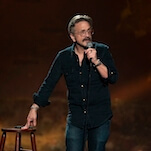As Everything Is Illuminated author Jonathan Safran Foer prepares to accompany an anonymous activist on a 3 a.m. raid of a factory farm in his new nonfiction book Eating Animals, he runs through a litany of his qualifications. He’s “not a journalist, activist, veterinarian, lawyer, or philosopher”; growing up in New Jersey, he claims never to have approached a farm animal before, except as dinner. He’s just an Everyguy who stumbled into an industrial chicken coop. But because Foer can never decide whether to play the Michael Moore-esque bumbler or the credible expert, his book-length report on why he decided to become a vegetarian is tedious, overwritten, and worst of all, unconvincing.
Foer begins Eating Animals with some philosophical meandering about the meanings of food and animals’ place in contemporary society before shifting to an exposé of the factory farming system, from which Americans get 99 percent of their meat. Ostensibly, his son’s birth prompted him to investigate the source of his food, so he visits a natural cattle ranch in California and an independent slaughterhouse in the Midwest, reaching conclusions familiar to Eric Schlosser and Michael Pollan’s readers: Efficient but toxic corporate farms with powerful lobbies have destroyed the natural rhythms of farm life and poisoned their products in the process of trying to produce more than last year, causing their animals to suffer needlessly.
Foer assumes from the start that his readers belong to the segment of the world’s population that can afford to worry about where its food comes from, and he’s probably right. Yet he neglects his own compelling personal insights to focus on clumsy summations of other people’s research. Often, his book reads like the equivalent of a forwarded editorial from a strident friend. His anecdote about his Holocaust-survivor grandmother hoarding dozens of bags of flour in her basement, illustrating the reverence for plenty she passed on, trumps pages of paraphrased industry reports on worker abuse in slaughterhouses.
Moreover, Foer infects every point of inquiry with deadly seriousness, giving equal weight to the trivia of an animal-rescue program funded by a Deadhead food truck, and death by drowning in hog-farm waste-holding pools. When a slaughterhouse owner tells Foer that his being Jewish while reporting on pork production is “kind of funny,” must the authorial voice jump in with “But it isn’t”? It’s as if the slightest joke might weaken his resolve to give up meat forever, in which case Eating Animals might fail to convince its true intended audience. Foer admits he isn’t a journalist, but his smug tone suggests he isn’t even interested in being an observer. He preaches to the converted as if they were the unsaved, and by the time he compares vegetarianism to the Boston Tea Party, neither camp will be paying attention to his sermon.









































